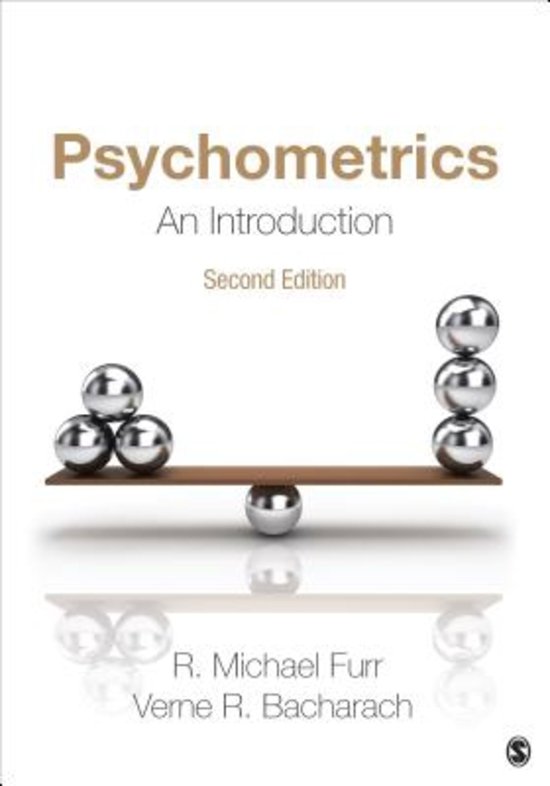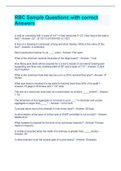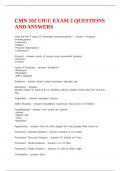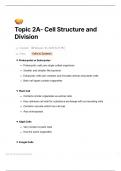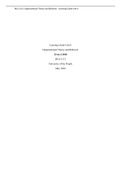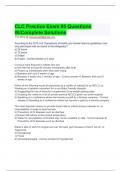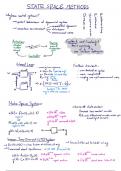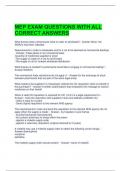Chapter 5
Reliability
Reliability fundamental to psychological measurements actually reflecting real
psychological differences
Must estimate a tests’ reliability
Classical Test Theory
- Measurement theory defining conceptual basis of reliability, outlines
procedures for estimating reliability of psychological measures
- Test’s reliability reflects extent to which differences in respondents’ test
scores are a function of their true psychological differences
- Reliability derives from observed scores, true scores, and measurement error
Observed scores (OS)- values that are obtained from the measurement of some
characteristic of a person
True scores- real amounts of that characteristic
Reliability- extent to which differences in respondents’ observed score are
consistent with differences in their true scores
How much differences in respondents’ observed scores are attributable to
differences in true scores, not other unknown test administration
characteristics
Measurement error- extent to which other characteristics contribute to differences
in observed scores- creates inconsistency between observed scores and true scores
To evaluate reliability of scores from any measure, must estimate how much
individual differences in OS are due to error or whether they are a function of true
scores
- Reliability is ration of signal and noise
o Reliability clearest when strong signal and/or little noise
Reliability dependent on:
1. Extent to which differences in test scores can be attributed to real inter/intra-
individual differences
2. Extent to which differences in test scores are a function of measurement error
CTT- person’s observed score is function of true score+ error
- Fundamental CTT assumption= observed scores on psychological measure
are determined
by respondents’ true scores and measurement error
o Assumption about measurement error: error occurs as if it were
random
, Measurement error is just as likely to increase, as it is to
decrease a particular score
Two consequences of this error assumptions:
1. Error tends to cancel itself out across respondents
o Deflates scores and inflates others in such a way that
average effect of error is 0
2. Error scores are uncollected with true scores
o Error affects observed scores independent of respondent’s true levels
of self-esteem, so correlation is 0
Variances in Observed Scores, True Scores, Error scores
Variance of Error Scores
Error variances shows how much
error affects different individuas in
different ways
- High error variance, potential for poor measurement
If individual’s observed score is sum of true score and error score, and measurement
error is random, then total variance of observed scores from group of individuals:
Different from composite variable in chap. 3
- composite variable is available
that is sum of 2 components
o Observed scores can be seen as composite scores: sum of true scores
and measurement scores
- We assume error is independent of true scores- correlation between error
score and true score is 0, so RH side of equation from chapter 2 is dropped
Four Ways to Think of Reliability
Each from associations between observed scores, true scores, measurement error
4 ways reflect 2 distinctions in conceptualisation of reliability
1. Is reliability conceptualised in terms of proportion of variance or correlations?
2. Is reliability conceptualised in terms of observed scores as related to true
scores or measurement error
Reliability
Reliability fundamental to psychological measurements actually reflecting real
psychological differences
Must estimate a tests’ reliability
Classical Test Theory
- Measurement theory defining conceptual basis of reliability, outlines
procedures for estimating reliability of psychological measures
- Test’s reliability reflects extent to which differences in respondents’ test
scores are a function of their true psychological differences
- Reliability derives from observed scores, true scores, and measurement error
Observed scores (OS)- values that are obtained from the measurement of some
characteristic of a person
True scores- real amounts of that characteristic
Reliability- extent to which differences in respondents’ observed score are
consistent with differences in their true scores
How much differences in respondents’ observed scores are attributable to
differences in true scores, not other unknown test administration
characteristics
Measurement error- extent to which other characteristics contribute to differences
in observed scores- creates inconsistency between observed scores and true scores
To evaluate reliability of scores from any measure, must estimate how much
individual differences in OS are due to error or whether they are a function of true
scores
- Reliability is ration of signal and noise
o Reliability clearest when strong signal and/or little noise
Reliability dependent on:
1. Extent to which differences in test scores can be attributed to real inter/intra-
individual differences
2. Extent to which differences in test scores are a function of measurement error
CTT- person’s observed score is function of true score+ error
- Fundamental CTT assumption= observed scores on psychological measure
are determined
by respondents’ true scores and measurement error
o Assumption about measurement error: error occurs as if it were
random
, Measurement error is just as likely to increase, as it is to
decrease a particular score
Two consequences of this error assumptions:
1. Error tends to cancel itself out across respondents
o Deflates scores and inflates others in such a way that
average effect of error is 0
2. Error scores are uncollected with true scores
o Error affects observed scores independent of respondent’s true levels
of self-esteem, so correlation is 0
Variances in Observed Scores, True Scores, Error scores
Variance of Error Scores
Error variances shows how much
error affects different individuas in
different ways
- High error variance, potential for poor measurement
If individual’s observed score is sum of true score and error score, and measurement
error is random, then total variance of observed scores from group of individuals:
Different from composite variable in chap. 3
- composite variable is available
that is sum of 2 components
o Observed scores can be seen as composite scores: sum of true scores
and measurement scores
- We assume error is independent of true scores- correlation between error
score and true score is 0, so RH side of equation from chapter 2 is dropped
Four Ways to Think of Reliability
Each from associations between observed scores, true scores, measurement error
4 ways reflect 2 distinctions in conceptualisation of reliability
1. Is reliability conceptualised in terms of proportion of variance or correlations?
2. Is reliability conceptualised in terms of observed scores as related to true
scores or measurement error

